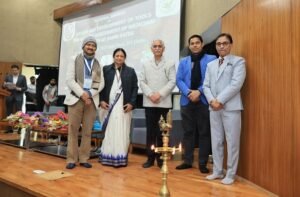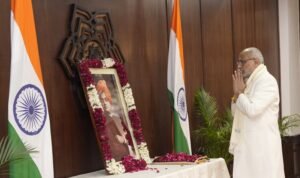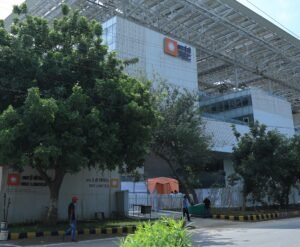Greater Noida (Hridaya Mohan): In the theatre of global diplomacy, some events unfold quietly, without fanfare, yet ripple far beyond the table. One such moment occurred recently in Washington, when US President Donald Trump hosted a quiet lunch for Pakistan’s newly appointed Field Marshal Asim Munir — a meeting that was as telling in its timing as in its symbolism.
Field Marshal Munir had reportedly travelled to the United States to attend a military parade — a claim broadcast widely in Pakistani media. The White House, however, categorically denied issuing any such invitation. For many, it looked like a snub. But then, the surprise lunch with President Trump flipped the narrative — an unofficial engagement that suddenly carried significant diplomatic weight.
The Lunch That Wasn’t Just Lunch
Field Marshal Munir now occupies the most elevated military position in Pakistan — not just in title, but in power projection. In a country where the military has long held sway over civilian governance and foreign policy, this lunch with the American President served more than pleasantries. It sent a message: Pakistan’s military remains a geopolitical actor the world must engage with, regardless of formal channels.
For President Trump, the lunch was also useful. Known for his preference for direct, personal diplomacy, Trump signaled that his White House continues to operate on a separate wavelength — one where engagement is unfiltered and often unpredictable.
ट्रंप मुनीर से मीटिंग के बाद ईरान-इज़राइल मुद्दे पर मुनीर से हुई बातचीत के सवाल पर ट्रंप का जवाब
“पाकिस्तान बेशक ईरान को बेहतर तरीक़े से जानता हो… पर जो हो रहा है उससे खुश नहीं है… वह इज़राइल के मामले में भी बुरा नहीं है… वह ईरान पर मुझसे सहमत हैं…” https://t.co/jl05GADfHK pic.twitter.com/qgzQOHHeAL
— Umashankar Singh उमाशंकर सिंह (@umashankarsingh) June 19, 2025
The Iran-Israel Context: Rebalancing the Board
This meeting comes amid a fraught regional backdrop. The Iran-Israel conflict is no longer limited to rhetoric — it has escalated into real confrontations. Pakistan, while officially neutral, is strategically entangled: sharing a border with Iran, tied economically to Saudi Arabia and diplomatically balancing multiple contradictions.
In that context, engaging Field Marshal Munir offers Washington an indirect line into the region’s fault lines. For Trump, who has often positioned himself as a dealmaker above doctrine, this could be an attempt to reassert American brokerage capacity — possibly even prepare for a peace initiative or backchannel engagement in the region.
Trump’s Long Game: A Nobel in Sight?
President Trump has not hidden his ambition for a Nobel Peace Prize. The Abraham Accords were his previous pitch. Now, in his second term, engaging military leaders from volatile regions may be part of a broader plan to position himself as the one world leader who can speak to all sides — even those others won’t.
A lunch with Field Marshal Munir, then, is more than optics — it’s a page in a larger narrative Trump is scripting for his legacy: unconventional, direct and globally relevant.
What of 9/11? A Nation Forgets
What’s perhaps most striking is the absence of controversy in the United States. That a Pakistani military chief — from the same institution that harbored Osama bin Laden and played both sides in the War on Terror — could be quietly welcomed into the White House is a stark sign of strategic amnesia.
9/11, which once shaped American foreign policy, has receded into distant memory. Pakistan’s double games in Afghanistan, its entanglements with extremist networks — none of it seems to matter much anymore. Realpolitik has overtaken remembrance.
A Quiet Lunch with Loud Echoes
President Trump’s meeting with Field Marshal Munir was not just an informal courtesy. It was a message to multiple audiences — from Islamabad to Tehran, from Riyadh to New Delhi. It reinforced the idea that access and optics still matter, even in the age of multipolar complexity.
For Pakistan’s military, it was a photo op with deeper purpose. For the US, it was a reminder of old tools still in use. For India, it was a signal not to take any strategic alignment for granted — and a cue to double down on both vigilance and diplomacy.
Sometimes, it’s not who is left out of a parade — but who’s invited to lunch — that changes the script.
India Watches — and Worries
For India, this lunch rings more than a few alarm bells. Not because of what was said — we don’t know — but because of what it represents.
First, the US continues to treat Pakistan’s military as a relevant interlocutor bypassing its civilian government, even as New Delhi has invested in building a “values-based” strategic partnership and counterterrorism priorities with Washington. This can only be read as dissonant now.
Second, the informal nature of the Munir-Trump lunch bypasses traditional diplomacy — which means India’s usual levers of influence within US institutions may not apply. This is especially important if Trump’s foreign policy becomes increasingly personality-driven and opportunistic. It reminds Indian policymakers that Pakistan’s traditional leverage — rooted in geography, nuclear capability and the Afghan corridor — remains alive, especially when regional crises intensify.
Third, it revives a historical unease: that the US, for all its strategic declarations, may still revert to old habits — treating Pakistan’s generals as indispensable “problem-solvers” in South Asia, despite India’s rising global stature.
In New Delhi’s strategic community, there is now fresh urgency to read between the lines. Is this merely Trumpian showmanship — or the start of a recalibrated approach to South Asia that places utility above alignment?
The Public Consequences
Field Marshal Munir’s meeting with President Trump may have been quiet, but its resonance is anything but. It reflects the return of transactional diplomacy, the persistence of military influence in South Asia and the shifting winds in American strategic memory.
For India, it is a timely reminder: the great game never ends — it simply shifts its venue and sometimes, its menu.
About the Author

Mr. Hridaya Mohan (hridayamohan@yahoo.co.in) is a regular Columnist with a renowned Indian daily “The Hitavada”, “Bharat Neeti Media” and some other newspapers / magazines internationally. Superannuated as Executive Director, Steel Authority of India Ltd. (SAIL), he is Senior Adviser, Metallon Holdings Pvt. Ltd. presently. He headed SAIL office at Beijing as Chief Representative (China & Mongolia) for six years. He has published and presented seventeen papers globally. Recipient of “Sir M Visvesvaraya Gold Medal”for one of his papers, “Benchmarking of Maintenance Practices in Steel Industry” from The Institution of Engineers (India), he was awarded with “Scroll of Honour” for the excellent contributions to Engineering fraternity from IE(I), Bhilai, “Jawahar Award” for leadership excellence in SAIL and “Supply Chain Leader – 2017” award from IIMM.









